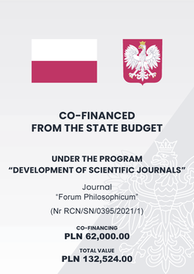- Home »
- Issues »
- 27/2 – Fall 2022 »
- Articles »
Emotional Affectivity and the Question of Appraisal, Viewed in the Light of a Phenomenological Account of Pre-Reflective Affective Consciousness
Abstract
The paper considers the problem of various different forms of pre‑cognitive affective appraisal and their role in the process of gaining self-knowledge. According to the phenomenological approach, if we are to understand our inner states (our emotional experiences), these cannot be extracted from the context within which they arise. Emotions not only refer to the inner states of the subject, but also to the outer world to which they are a form of response. Brentano, Husserl and Scheler claimed that emotions are directed towards values. It is to this essential feature of emotional experience that I would like to turn. I shall therefore re-examine Sartre’s views concerning affectivity (i.e. the capacity to reveal evaluatively significant qualities of one’s environment), as well as the dual-aspect theory of (reflective and non-reflective) consciousness. The main argument of this paper is that a plausible account of the essential role of affectivity in the emotions may be provided on the basis of a phenomenological theory of pre-reflective consciousness and its relation to reflexivity. I will focus on three different claims about pre-reflective (affective) consciousness. According to the first of these, a large part of cognition is of a prelinguistic (pre-reflective) nature; I argue that the evaluative content of emotion is not only conceptually determined, but may also take a non-conceptual form (as affective appraisal). The second claim refers to the notion of affect, which ought to be distinguished from (unintentional) bodily sensations. The third conceives of the relation between pre-reflective (affective) consciousness and reflective consciousness (propositional attitudes) as normative (rather than causal). I aim to demonstrate that a plausible view of emotional affectivity must appeal to a phenomenological account of the pre-reflective aspect of consciousness.
Keywords
- Emotional Affectivity
- Feelings
- Pre-reflective Affective Consciousness
- Sartre
- Jean-Paul
- Sartre Jean-Paul
Cite this article
Warmbier, Adriana. “Emotional Affectivity and the Question of Appraisal, Viewed in the Light of a Phenomenological Account of Pre-Reflective Affective Consciousness.” Forum Philosophicum 27, no. 2 (2022): 163–77. doi:10.35765/forphil.2022.2702.10.
Bibliography
Ben-Ze’ev, Aaron. 1993. The Perceptual System. A Philosophical and Psychological Perspective. New York: Peter Lang. —. 2000. The Subtlety of Emotions. Cambridge, MA: MIT Press. Damasio, Antonio. 1994. Descartes’ Error: Emotion, Reason, and the Human Brain. New York: Avon Books. —. 1999. The Feeling of What Happens. Body and Emotion in the Making of Consciousness. New York: Harcourt. Dąbrowski, Andrzej. 2014. “Czym są emocje? Prezentacja wieloskładnikowej teorii emocji.” Analiza i Egzystencja 27: 123–46. Deonna, Julien A., and Fabrice Teroni. 2012. The Emotions. A Philosophical Introduction. London: Routledge. Dodds, Eric R. 2004. The Greeks and the Irrational. Berkeley: California University Press. Greenspan, Patricia S. 1988. Emotions and Reasons. An Inquiry into Emotional Justification. New York: Routledge. Hatzimoysis, Anthony. 2014. “Consistency in the Sartrean analysis of emotion.” Analysis 74 (1): 81–3. https://doi.org/10.1093/analys/ant084. Husserl, Edmund. 2001. Analyses concerning passive and active synthesis. Lectures on transcendental logic. Translated by Anthony J. Steinbock. Dordrecht: Kluwer Academic. James, William. 1884. “What is an Emotion?” Mind 9 (4): 188–205. https://doi.org/10.1093/mind/os-IX.34.188. Kępiński, Antoni. 2013. Psychopatie. Krakow: Wydawnictwo Literackie. LeDoux, Joseph. 1996. The Emotional Brain. New York: Simon and Schuster. Lyons, William. 1980. Emotions. Cambridge: Cambridge University Press. Montague, Michelle. 2009. “The Logic, intentionality, and phenomenology of emotion.” Philosophical Studies 145: 171–92. https://doi.org/10.1007/s11098-008-9218-0. —. 2014. “Evaluative Phenomenology.” In Emotion and Value, edited by Sabine Roeser and Cain Todd, 32–51. Oxford: Oxford University Press. Nussbaum, Martha C. 2001. Upheavals of Thought. The Intelligence of Emotions. Cambridge: Cambridge University Press. Pokropski, Marek. 2013. Cielesna geneza czasu i przestrzeni. Warsaw: IFiS PAN. Power, Mick, and Tim Dalgleish. 1997. Cognition and Emotion. From Order to Disorder. Hove: The Psychology Press. Richmond, Sarah. 2014. “Inconsistency in Sartre’s analysis of emotion.” Analysis 74 (4): 612–5. https://doi.org/10.1093/analys/anu091. Salmela, Mikko. 2002. “The problem of affectivity in cognitive theories of emotion.” Consciousness & Emotion 3 (2): 159–82. https://doi.org/10.1075/ce.3.2.04sal. —. 2008. “How to evaluate the factual basis of emotional appraisals?” In Fact and Value in Emotion, edited by Louis C. Charland and Peter Zachar, 35–51. Amsterdam: John Benjamins. Sartre, Jean-Paul. 2002. Sketch for a Theory of the Emotions. Translated by Philip Mairet. Oxford: Routledge. —. 2003. Being and Nothingness. Translated by Hazel E. Barnes. Oxford: Routledge. —. 2004. The Imaginary: a phenomenological psychology of the imagination. Translated by Jonathan Webber. London: Routledge. Scheler, Max. 1973. Formalism in Ethics and Non-Formal Ethics of Values. Translated by Manfred S. Frings and Robert L. Funk. Evanston, IL: Northwestern University Press. Solomon, Robert C. 1993. The Passions. Emotions and the Meaning of Life. Indianapolis, IN: Hackett. —. 2003. “On Emotions as Judgments.” In Not Passion’s Slave: Emotions and Choice. New York: Oxford University Press. —. 2004. “Emotions, Thoughts, and Feelings. Emotions as Engagements with the World.” In Thinking About Feeling: Contemporary Philosophers on Emotions, edited by Robert C. Solomon, 76–88. Oxford: Oxford University Press. Vanello, Daniel. 2019. “Early Sartre on self-understanding, affectivity, and value.” History of Philosophy Quarterly 36 (1): 79–99. https://doi.org/10.2307/48570932.





